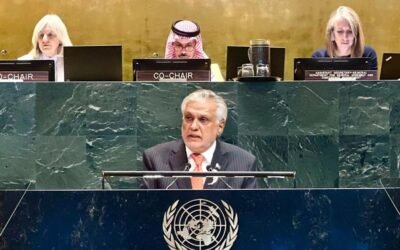Pakistan, a nation that contributes less than 1% to global carbon emissions, yet consistently ranks among the top 10 most vulnerable countries to climate change, is increasingly using its foreign policy to address a growing existential threat. Severe climate-related disasters, most notably the catastrophic 2022 floods that submerged a third of the country, have fundamentally redefined Pakistan’s diplomatic agenda. This shift, often termed “climate diplomacy,” focuses on three key pillars: advocating for global climate justice, securing international “loss and damage” funding, and navigating complex relations with major polluting nations.
You May Like To Read: DG ISPR Briefing: Pakistan Armed Forces Lead Massive Relief Effort as Floods Wreak Havoc Across the Nation
The Global Climate Justice Champion
The core of Pakistan’s climate diplomacy is its powerful narrative as a victim of a problem it did not create. The devastating floods of 2022, which caused over $30 billion in damages and affected more than 33 million people, served as a stark, real-world example of climate injustice. Instead of framing the floods as a simple natural disaster, Pakistan’s government, led by its then-Minister for Climate Change, Sherry Rehman, transformed it into a global talking point on the disproportionate impacts of climate change. This enabled Pakistan to become a leading voice for the Global South, highlighting how developing nations bear the brunt of a crisis fueled by the historical emissions of industrialized countries.

At international forums like the annual Conference of the Parties (COP) under the United Nations Framework Convention on Climate Change (UNFCCC), Pakistan has leveraged its moral authority to push for a more equitable global response. As the elected president of the G77 plus China negotiating bloc, a coalition of 134 developing nations, Pakistan has successfully united diverse countries behind a common agenda. Its advocacy has been instrumental in shifting the global conversation from just mitigation and adaptation to one that includes the critical issue of loss and damage.

The Quest for “Loss and Damage” Funding
A central triumph of Pakistan’s climate diplomacy was the establishment of the Loss and Damage Fund at COP27 in Sharm El Sheikh, Egypt. For decades, developing nations had been demanding a dedicated fund to compensate for the irreversible and unadaptable impacts of climate change, but developed countries consistently blocked the proposal. The 2022 floods in Pakistan, along with other extreme weather events around the world, provided the undeniable evidence needed to overcome this resistance. Pakistan’s diplomatic efforts, both at the negotiating table and through powerful public appeals, were credited with being the primary catalyst for the fund’s creation.
The fund’s establishment was hailed as a historic victory for climate justice. It represented a formal acknowledgement by the international community that rich, polluting nations have a financial and moral obligation to help vulnerable countries cope with the consequences of climate change. While the fund is still in its nascent stages and faces challenges related to its capitalization and operationalization, it is a direct reflection of how a country’s lived experience with an environmental crisis can be weaponized for diplomatic gain. Pakistan continues to play a key role in the transitional committee, ensuring that the fund’s mechanisms are fair and accessible to all particularly vulnerable nations.
Navigating Relations with Major Polluters
Pakistan’s climate diplomacy is not limited to multilateral forums. It also involves a delicate balancing act in its bilateral relations with some of the world’s largest emitters, including the United States, China, and the European Union. While these nations are major sources of greenhouse gas emissions, they are also crucial partners for Pakistan in terms of economic aid, trade, and development.
With its long-standing ally China, for instance, Pakistan has to navigate a complex dynamic. China is a major investor in Pakistan through the China-Pakistan Economic Corridor (CPEC), which includes many coal-based power projects. At the same time, Pakistan is pushing for a transition to renewable energy. Pakistan’s diplomacy with China involves seeking green technology transfers and climate-friendly investments under CPEC, while also quietly urging for greater climate action on a global scale. This is a subtle but crucial aspect of Pakistan’s foreign policy, as it needs to secure its economic future without compromising its climate vulnerability.
Similarly, Pakistan’s relationship with the United States and European nations is defined by its pursuit of climate finance and technology. While Pakistan is a recipient of climate-related aid, it is actively advocating for a larger, grant-based system of funding rather than loans that increase its debt burden. This diplomatic push aims to hold developed nations accountable for their historic emissions and ensure that climate finance is not just a form of “aid” but a form of “reparations” for the damages caused.
In a rare instance of “climate diplomacy” with its arch-rival India, the two countries have recently found a shared interest in combating transboundary issues like air pollution (smog). This shared environmental problem, which affects cities on both sides of the border, has opened a small window for dialogue and cooperation. While this does not mean an end to their long-standing political tensions, it underscores how environmental crises can become an unlikely catalyst for diplomatic engagement, even between hostile neighbors.

In sum, Pakistan’s foreign policy is no longer just about traditional security, trade, and geopolitical alliances. It is being fundamentally shaped by the urgent need to address climate-related disasters. By championing global climate justice, leading the charge for the Loss and Damage Fund, and carefully navigating its relationships with major polluters, Pakistan is redefining its role on the world stage. It’s a new kind of diplomacy—one where environmental crises are not just domestic issues, but powerful leverage for international change.
You May Like To Read: DG ISPR Briefing: Pakistan Armed Forces Lead Massive Relief Effort as Floods Wreak Havoc Across the Nation




























